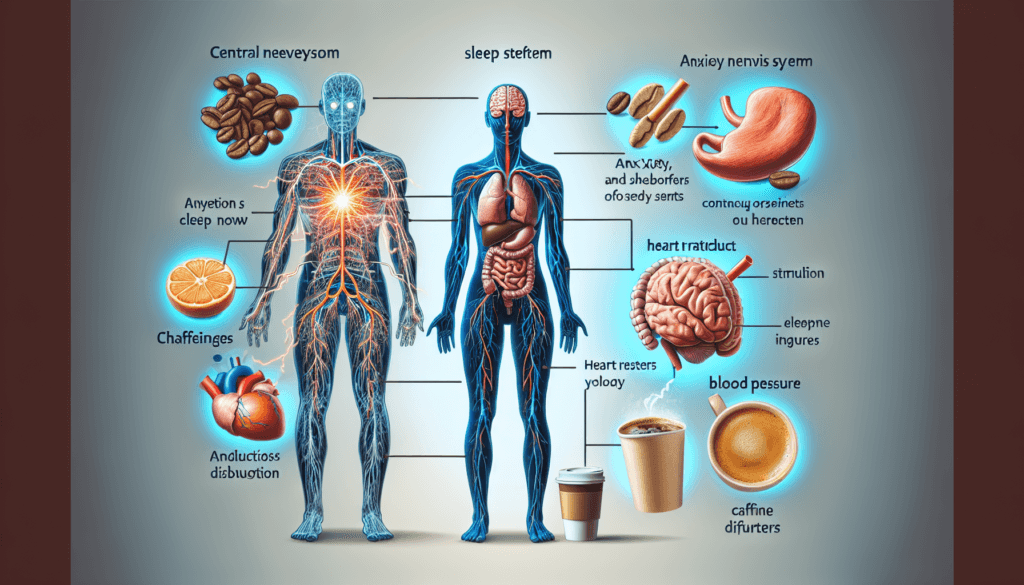Imagine starting your day with a cup of coffee, feeling the warm liquid awaken your senses, and giving you that much-needed jolt of energy. But have you ever wondered what caffeine does to your body? This article will explore the fascinating effects that this beloved stimulant has on your physical and mental well-being. So, sit back, relax, and prepare to discover the secrets behind that morning pick-me-up.

Stimulates the Nervous System
Effects on Brain Function
Caffeine, found in various beverages and foods, is known for its ability to stimulate the nervous system. When consumed, it quickly crosses the blood-brain barrier, allowing it to affect brain function. Caffeine works by blocking the action of adenosine, a neurotransmitter that promotes relaxation and sleep. By blocking adenosine receptors, caffeine increases neural activity in the brain, leading to increased mental alertness and focus.
Increases Mental Alertness and Focus
One of the well-known effects of caffeine on the body is its ability to enhance mental alertness and focus. When you consume caffeine, it stimulates the central nervous system, making you feel more awake and alert. This can be particularly beneficial during times when you need to concentrate and be mentally sharp, such as when studying or working on important tasks.
Enhances Reaction Time
Another significant benefit of caffeine is its ability to improve reaction time. Studies have shown that caffeine can enhance reaction time, allowing you to respond more quickly to stimuli. This can be particularly beneficial in activities that require quick reflexes, such as driving or playing sports. By consuming caffeine, you can potentially enhance your reaction time and perform at your best.
Improves Mood
Caffeine has been shown to have a positive impact on mood. It acts as a mild stimulant, increasing the release of neurotransmitters like dopamine and serotonin, which are associated with pleasure and happiness. By consuming caffeine, you may experience an uplift in your mood and overall sense of well-being. However, it’s important to note that individual responses to caffeine can vary, and excessive consumption may lead to jitteriness and anxiety in some individuals.
Boosts Physical Performance
Increases Endurance
Caffeine has been shown to increase endurance during physical activities. It does so by stimulating the release of fatty acids into the bloodstream, which can then be used as a fuel source. This allows your body to conserve its limited glycogen stores, extending the time to exhaustion during endurance exercises like running or cycling. By supplementing with caffeine, you can potentially improve your endurance and perform better during prolonged physical activities.
Enhances Muscle Strength
In addition to boosting endurance, caffeine has also been shown to enhance muscle strength. It does this by stimulating the nervous system and improving the connection between the brain and muscles. This results in increased muscle activation and force production, allowing you to lift heavier weights and perform at a higher level during strength training sessions.
Improves Energy Levels
Feeling fatigued and lacking energy can be detrimental to your physical performance. Caffeine can help combat these issues by stimulating the release of adrenaline, a hormone that triggers the body’s “fight or flight” response. This leads to increased heart rate and blood flow, providing a surge of energy. By consuming caffeine before your workout or physical activity, you can experience a boost in energy levels, allowing you to push harder and perform at your best.
Aids in Fat Burning
Caffeine has been extensively studied for its potential fat-burning properties. It is known to increase thermogenesis, which is the body’s production of heat. This elevation in body temperature can lead to an increase in calorie expenditure and aid in fat burning. Additionally, caffeine has been shown to enhance fat oxidation, meaning it promotes the breakdown and utilization of stored body fat as an energy source. By incorporating caffeine into your fitness routine, you may be able to enhance your fat-burning capabilities and achieve your weight loss goals more effectively.

Increases Metabolism and Fat Burning
Raises Metabolic Rate
One of the significant benefits of caffeine is its ability to raise metabolic rate. When consumed, caffeine stimulates the sympathetic nervous system, which is responsible for regulating various bodily functions, including metabolism. By increasing metabolic rate, caffeine can lead to an increase in calorie burning, even at rest. This can be particularly beneficial for individuals looking to maintain a healthy weight or lose weight.
Promotes Thermogenesis
In addition to raising metabolic rate, caffeine also promotes thermogenesis. Thermogenesis is the process by which the body produces heat. When caffeine is ingested, it increases the production of heat in the body, leading to an increase in calorie expenditure. This can be particularly advantageous for individuals looking to enhance their fat-burning capabilities and achieve their weight loss goals.
Aids in Weight Loss
Due to its ability to raise metabolic rate and promote thermogenesis, caffeine has been shown to aid in weight loss. By consuming caffeine, you can potentially increase the amount of calories burned, leading to a higher calorie deficit, which is necessary for weight loss. However, it’s important to note that caffeine should not be relied upon as a sole means of weight loss. It should be used in conjunction with a balanced diet and regular exercise for optimal results.
Breaks Down Body Fat
Caffeine also plays a role in the breakdown of body fat. It enhances lipolysis, the process by which stored fat is broken down and released into the bloodstream as fatty acids. Once released, these fatty acids can be utilized as an energy source, further contributing to fat burning. By incorporating caffeine into your weight loss journey, you may be able to help facilitate the breakdown of body fat and achieve your desired body composition.
Enhances Digestive System
Stimulates Bowel Movements
Caffeine has a mild laxative effect on the digestive system, which can help stimulate bowel movements. If you’re experiencing constipation or irregularity, consuming caffeine may help promote regularity and ease bowel movements. However, it’s important to note that excessive consumption of caffeine can lead to overstimulation of the digestive system and potentially cause diarrhea or other digestive issues. It’s best to consume caffeine in moderation and listen to your body’s cues.
Promotes Increased Stomach Acid Secretion
Caffeine stimulates the production of stomach acid, which can aid in the digestion of food. By increasing stomach acid secretion, caffeine can potentially enhance the breakdown of nutrients and promote efficient digestion. However, for individuals with certain digestive conditions like acid reflux or ulcers, excessive caffeine consumption may exacerbate symptoms. It’s important to consider your individual digestive health and tolerance when consuming caffeine.
Relieves Constipation
In addition to stimulating bowel movements, caffeine can also help relieve constipation. It acts as a natural diuretic, increasing urine production and promoting regularity. By incorporating moderate amounts of caffeine into your diet, you may experience relief from constipation and improved digestive regularity. However, it’s crucial to maintain hydration and balance caffeine intake with adequate water consumption to avoid dehydration and potential exacerbation of constipation symptoms.

Decreases Risk of Certain Diseases
Reduces Risk of Stroke
Studies have shown that caffeine consumption is associated with a reduced risk of stroke. The stimulating effects of caffeine on the nervous system have been linked to lower incidences of ischemic strokes, which occur when a blood vessel supplying the brain is blocked. However, it’s important to note that moderation is key, as excessive consumption of caffeine can have adverse effects on cardiovascular health. Aim to consume caffeine in moderation and consult with your healthcare provider for personalized recommendations.
Lowers Risk of Parkinson’s Disease
Another potential benefit of caffeine is its ability to lower the risk of Parkinson’s disease. Parkinson’s is a neurodegenerative disorder characterized by the loss of dopamine-producing cells in the brain. Caffeine has been shown to protect these cells and reduce the risk of Parkinson’s disease development. However, more research is needed to understand the optimal dosage and long-term effects of caffeine on Parkinson’s disease prevention.
Decreases Risk of Liver Disease
Caffeine consumption has also been associated with a decreased risk of liver disease. Studies have shown that caffeine may reduce the risk of liver cirrhosis, a condition characterized by extensive liver damage. Additionally, caffeine has been shown to reduce the risk of liver cancer, one of the leading causes of cancer-related deaths worldwide. However, it’s important to note that excessive intake of caffeine through high-sugar, high-calorie beverages can have detrimental effects on liver health. Focus on incorporating caffeine from healthier sources, such as coffee or tea, for optimal benefits.
Protects Against Alzheimer’s Disease
Emerging research suggests that caffeine may have protective effects against Alzheimer’s disease, a progressive neurodegenerative disorder. Studies have shown that caffeine can inhibit the production of beta-amyloid plaques, which are believed to contribute to the development of Alzheimer’s disease. By incorporating moderate amounts of caffeine into your diet, you may potentially lower the risk of developing this debilitating condition. However, it’s important to note that more research is needed to fully understand the role of caffeine in Alzheimer’s disease prevention.
Increases Energy and Alertness
Provides Temporary Energy Boost
One of the immediate effects of consuming caffeine is its ability to provide a temporary energy boost. By stimulating the nervous system, caffeine can increase alertness and combat drowsiness, making you feel more awake and energized. Whether you need a pick-me-up in the morning or an extra burst of energy during the day, caffeine can help provide that temporary energy boost to keep you going.
Combats Drowsiness and Fatigue
Feeling drowsy or fatigued can significantly impact productivity and overall well-being. Caffeine has been shown to combat drowsiness and fatigue by blocking the action of adenosine, a neurotransmitter that promotes sleepiness. By consuming caffeine, you can potentially feel more alert and awake, allowing you to tackle your tasks with renewed energy and focus.

May Improve Exercise Performance
Enhances Fat Utilization
Caffeine has been shown to enhance fat utilization during exercise. By increasing the release of fatty acids into the bloodstream, caffeine can increase the availability of fat as an energy source. This can be particularly beneficial during endurance exercise, where fat utilization plays a significant role. By incorporating caffeine into your pre-workout regimen, you may be able to optimize your body’s fat-burning capabilities and potentially improve exercise performance.
Improves Strength and Power Output
In addition to enhancing fat utilization, caffeine has also been shown to improve strength and power output during exercise. It stimulates the central nervous system, leading to increased neural activation and muscle force production. This can result in improved performance during strength training sessions or activities that require explosive power, such as sprinting or jumping. By consuming caffeine, you may be able to tap into your full potential and enhance your physical performance.
Promotes Mental Performance
Enhances Concentration
Caffeine has long been known for its ability to enhance concentration and focus. By blocking adenosine receptors in the brain, caffeine increases neural activity and promotes alertness. This can be particularly beneficial during periods of intense mental work, such as studying or problem-solving. By incorporating caffeine into your routine, you can potentially enhance your concentration and optimize your mental performance.
Improves Memory and Cognitive Function
Studies have shown that caffeine can also improve memory and cognitive function. It has been found to enhance short-term memory, attention, and reaction time. By consuming caffeine, you may be able to improve your ability to process information, retain knowledge, and perform mentally demanding tasks. However, it’s important to note that individual responses to caffeine can vary, and excessive consumption may lead to restlessness or anxiety in some individuals.
May Decrease Risk of Depression
Boosts Mood
Caffeine has been shown to have a positive impact on mood, primarily due to its ability to increase the production of dopamine and serotonin, neurotransmitters associated with pleasure and happiness. By consuming caffeine, you may be able to experience an uplift in your mood and a temporary boost in overall well-being.
Reduces Risk of Depression and Suicide
Emerging research suggests that caffeine consumption may be linked to a reduced risk of depression and suicide. Studies have shown that individuals who consume caffeine regularly may have a lower risk of developing depression or experiencing suicidal thoughts. However, it’s important to note that more research is needed to fully understand the relationship between caffeine and mental health outcomes. If you’re experiencing symptoms of depression, it’s essential to seek professional help and not rely solely on caffeine as a treatment method.
Side Effects and Considerations
Sleep Disturbances
One of the potential side effects of caffeine consumption is sleep disturbances. Caffeine is a stimulant, and its effects can persist for several hours after consumption. Consuming caffeine too close to bedtime may lead to difficulties falling asleep or disrupted sleep quality. It’s important to be mindful of your caffeine intake and consider limiting it in the late afternoon or evening to promote a healthy sleep routine.
Jitters and Anxiety
Excessive consumption of caffeine can lead to jitters and feelings of anxiety. Caffeine stimulates the central nervous system, and in high doses, it can cause restlessness and nervousness. Individuals who are sensitive to caffeine may be more prone to these side effects. It’s important to listen to your body and adjust your caffeine consumption accordingly to prevent or minimize these symptoms.
Addiction and Withdrawal Symptoms
Caffeine is a mild psychoactive substance that can lead to physical dependence when consumed in large amounts regularly. Abruptly decreasing or stopping caffeine intake can result in withdrawal symptoms such as headaches, fatigue, and irritability. It’s important to be mindful of your caffeine consumption and consider gradually reducing it if you wish to lower your dependence or quit altogether.
Increased Heart Rate and Blood Pressure
Another potential side effect of caffeine consumption is an increase in heart rate and blood pressure. Caffeine stimulates the release of adrenaline, leading to heightened cardiovascular activity. This can be concerning for individuals with pre-existing heart conditions or hypertension. It’s crucial to be aware of your individual tolerance to caffeine and consult with a healthcare professional if you have any concerns regarding its effects on your heart health.
In conclusion, caffeine has various effects on the body, from stimulating the nervous system to boosting physical performance and promoting mental alertness. It increases mental focus, reaction time, and enhances mood. Caffeine also has the potential to boost physical performance by increasing endurance, muscle strength, and energy levels. It aids in fat burning, metabolism, and digestion, and decreases the risk of certain diseases. Additionally, caffeine can increase energy levels, improve exercise performance, and enhance mental performance. It may decrease the risk of depression and suicide. However, it’s important to consider the potential side effects and individual considerations when consuming caffeine. By understanding the benefits and limitations of caffeine, you can make informed choices regarding your caffeine intake to support your overall well-being.


